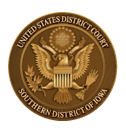GUIDELINES FOR ATTORNEY EXPENSES
IN CIVIL PRO BONO CASES
The Court appreciates pro bono services provided by the members of its Bar when requested in prisoner civil rights cases or other matters. There is no statutory provision for reimbursement of expenses. The Court, however, provides some reimbursement for reasonable out-of-pocket expenses from its Attorney Admission Fee Fund. These reimbursements might not cover all actual expenses. Unless the Court grants an exception, amounts reimbursed must be repaid to the fund if the case is settled with a payment of money, if fees and costs are awarded under 42 U.S.C. § 1988, or if plaintiff is awarded monetary damages. The following guidelines are intended to answer questions often asked.
1. Costs of lodging and meals. When you are out of town solely on business associated with your service on this case, the Court will reimburse you for lodging and meal expenses actually incurred, up to the government per diem allowance provided for court personnel. In the Southern District this most frequently involves trips to Fort Madison. Unless prior court approval is granted, the Court will not reimburse lodging and meal costs for law clerks, paralegals, secretaries, investigators or others. You may check with the Finance Deputy Clerk of Court to find out the current rates.
2. Mileage. The Court will reimburse appointed attorneys for travel costs at the government rate. Payment will be made only for mileage by the most direct route as reflected in the Iowa DOT map mileage chart. No reimbursement can be provided for in-town travel, for instance between your motel and the prison or restaurants, or between your office and the courthouse. The direct round trip mileage between Des Moines and Fort Madison is 320.
3. Copying. The Court will reimburse you the actual expense for copies of records and documents necessary for case preparation. No reimbursement is available for copies of cases or articles. If a government defendant attempts to impose higher copying costs, you should bring this to the Court’s attention before incurring the costs.
4. Computerized research. No reimbursement is available for the cost of services such as Lexis or Westlaw.
5. Expert witnesses. Expert witness expenses will be reimbursed only if prior court approval is obtained. You should submit a budget with your request; the Court will set a limit on expenses related to experts.
6. Deposition costs. The Court will reimburse you for court reporter fees for depositions of essential witnesses. To keep expenses down for depositions of out-of-town witnesses, we encourage taking depositions by telephone. Please note the $300 limit discussed in paragraph 11, below. You should not order a transcript of the deposition unless it is essential to the presentation of the case. If expenses are beyond the $300 limit, you shall first obtain Court approval.
Federal Court Reporting Guidance: https://www.uscourts.gov/rules-policies/judiciary-policies/court-reporting-guidance
Federal Court Reporting Program Maximum Transcript Rates : https://www.uscourts.gov/services-forms/federal-court-reporting-program
7. Witness fees and service of process fees. These will ordinarily be reimbursed. However, you are expected to use service by mail and any other appropriate method to reduce costs.
8. Recovery of costs advanced. If your client prevails in the suit and is entitled to an award of attorney fees and costs under 42 U.S.C. § 1988, the amounts advanced from the Attorney Admission Fee Fund must be included in your request to the Court for fees and costs. The expenses advanced by the Court’s fund and allowed by the Court shall be refunded. Amounts advanced from the fund should be deducted from any settlement or award and repaid to the fund, even if fees and costs are not awarded under section 1988.
9. Telephone calls, emails, and postage. The Court will reimburse you for necessary communication charges and postage incurred in your representation. Excessive phone calls or email charges for communications to and from the client will not be reimbursed, so be careful about accepting repeated collect calls from your client.
10. Procedure. Counsel are asked to advance reimbursable costs and then submit a request for reimbursement. The request should be captioned in the case for which you appeared pro bono publico, and should provide a sufficient explanation of the costs to allow the Court to understand the need to incur them. If possible, such requests should not be submitted until the representation is completed. However, if you have advanced a significant expense or the case remains pending for more than one year, interim requests for reimbursement will be approved.
11. Limitation and Advance Approval. You must secure advance approval from the Court before incurring any reimbursable expense which would take the total of such expenses (calculated in accordance with the above guidelines) over $300. For instance, if you have incurred reimbursable expenses of $290 and propose to take a deposition, you should apply for advance approval. The application should be captioned in the case for which you appear pro bono, and contain enough information for the Court to understand the need to exceed the $300 limit. An estimate of the total additional amount needed to complete the case should be provided, so the Court can set a specific dollar amount in excess of the limit. If you find it essential to exceed the approved amount, a further application should be made, with a proposed case budget.
12. Compensation. The Court may approve compensation of up to $5,000 per case and expenses for the representation of inmates in some prisoner civil rights cases.
Updated October, 2024
